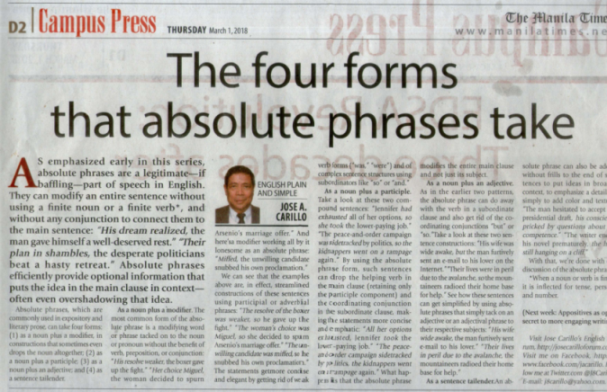As emphasized early in this series, absolute phrases are a legitimate—if baffling—part of speech in English. They can modify an entire sentence without using a finite noun or a finite verb*, and without any conjunction to connect them to the main sentence: “
His dream realized, the man gave himself a well-deserved rest.” “
Their plan in shambles, the desperate politicians beat a hasty retreat.” Absolute phrases efficiently provide optional information that puts the idea in the main clause in context—often even overshadowing that idea.
Absolute phrases, which are commonly used in expository and literary prose, can take four forms: (1) as a noun plus a modifier, in constructions that sometimes even drops the noun altogether; (2) as a noun plus a participle; (3) as a noun plus an adjective; and (4) as a sentence tailender.
As a noun plus a modifier. The most common form of the absolute phrase is a modifying word or phrase tacked on to the noun or pronoun without the benefit of verb, preposition, or conjunction: “
His resolve weaker, the boxer gave up the fight.” “
Her choice Miguel, the woman decided to spurn Arsenio’s marriage offer.” And here’s a modifier working all by it lonesome as an absolute phrase: “
Miffed, the unwilling candidate snubbed his own proclamation.”
We can see that the examples above are, in effect, streamlined constructions of these sentences using participial or adverbial phrases: “
The resolve of the boxer was weaker,
so he gave up the fight.” “
The woman’s choice was Miguel, so she decided to spurn Arsenio’s marriage offer.” “
The unwilling candidate was miffed,
so he snubbed his own proclamation.” The statements get more concise and elegant by getting rid of weak verb forms (“was,” “were”) and of complex sentence structures using subordinators like “so” or “and.”
As a noun plus a participle. Take a look at these two compound sentences: “
Jennifer had exhausted all of her options,
so she took the lower-paying job.” “T
he peace-and-order campaign was sidetracked by politics,
so the kidnappers went on a rampage again.” By using the absolute phrase form, such sentences can drop the helping verb in the main clause (retaining only the participle component) and the coordinating conjunction in the subordinate clause, making the statements more concise and emphatic: “
All her options exhausted,
Jennifer took the lower-paying job.” “
The peace-and-order campaign sidetracked by politics, the kidnappers went on a rampage again.” What happens is that the absolute phrase modifies the entire main clause and not just its subject.
As a noun plus an adjective. As in the earlier two patterns, the absolute phrase can do away with the verb in a subordinate clause and also get rid of the coordinating conjunctions “but” or “so.” Take a look at these two sentence constructions: “
His wife was wide awake,
but the man furtively sent an e-mail to his lover on the Internet.” “
Their lives were in peril due to the avalanche,
so the mountaineers radioed their home base for help.” See how these sentences can get simplified by using absolute phrases that simply tack on an adjective or an adjectival phrase to their respective subjects: “
His wife wide awake, the man furtively sent e-mail to his lover.” “
Their lives in peril due to the avalanche, the mountaineers radioed their home base for help.”
As a sentence tailender. An absolute phrase can also be added without frills to the end of sentences to put ideas in broader context, to emphasize a detail, or simply to add color and texture: “The man hesitated to accept the presidential draft,
his conscience pricked by questions about his competence.” “The writer ended his novel prematurely,
the hero still hanging on a cliff.”
With that, we’re done with our discussion of the absolute phrases.
-----------
*When a noun or verb is finite, it is inflected for tense, person, and number.This essay, 1081st in the series, appeared in the column “English Plain and Simple” by Jose A. Carillo in the Campus Press section of the March 1, 2018 issue (print edition only) of The Manila Times
, © 2018 by the Manila Times Publishing Corp. All rights reserved.
(Next week:
Appositives as open secret to more engaging writing) March 8, 2018